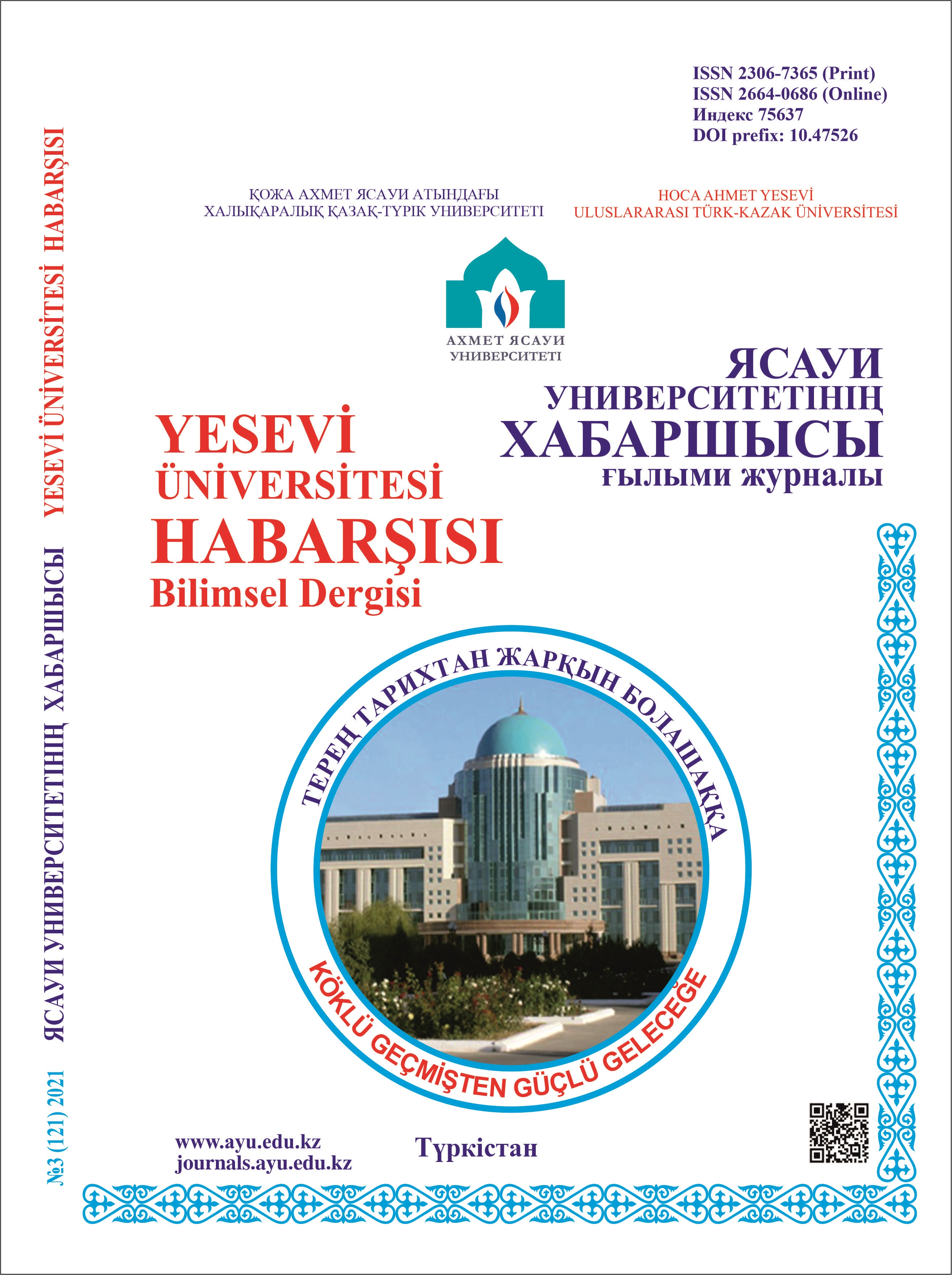Принципы и содержание обучения будущих учителей информатики разработке и использованию открытых образовательных ресурсов
204 120
Ключевые слова:
педагогика, учитель информатики, открытые образовательные ресурсы, их принципы, содержание открытых образовательных ресурсов.Аннотация
В статье рассматриваются принципы и содержание обучения будущих учителей информатики разработке и использованию открытых образовательных ресурсов. В настоящее время информатика играет важную роль в образовании, поэтому подготовка квалифицированных учителей в этой области становится необходимостью. Кроме того, в настоящее время открытые образовательные ресурсы широко поддерживаются на всех уровнях образования. Открытые образовательные ресурсы – это доступные онлайн-материалы, которые каждый может свободно использовать. Будущие учителя информатики должны ознакомиться с видами открытых ресурсов, принципами их разработки, интерактивными учебниками, видеолекциями, онлайн курсами и т.д. Обучение будущих учителей информатики разработке и использованию открытых образовательных ресурсов основано на нескольких принципах и включает в себя несколько ключевых аспектов. В ходе исследования были выявлены основные критерии и принципы разработки и использования открытых образовательных ресурсов. В статье также рассматриваются методы использования открытых образовательных ресурсов в учебном процессе, преимущества и трудности использования открытых образовательных ресурсов и даются рекомендации по эффективному использованию таких ресурсов в учебном процессе. Результаты исследования могут быть использованы в будущем при обучении учителей информатики разработке и использованию открытых образовательных ресурсов.
Библиографические ссылки
ПАЙДАЛАНЫЛҒАН ӘДЕБИЕТТЕР ТІЗІМІ
Кадирбаева Р.И., Бедебаева М.Е. Онлайн білім беру платформалары арқылы аралас оқыту технологиясын қолдану // Ясауи университетінің хабаршысы. – 2022. – №3 (125). – Б. 127–140. https://doi.org/10.47526/2022-3/2664-0686.11
Бисенгалиева А.М., Дюсегалиева К.О. ЖОО-да қашықтықтан оқытудың заманауи технологияларын меңгеру // Ясауи университетінің хабаршысы. – 2022. – №1 (123). – Б. 136–143. https://doi.org/10.47526/2022-1/2664-0686.12
Douglas A., Ismar Frango S. Quality assurance for open educational resources: The OER trust framework // International Journal of Learning, Teaching and Educational Research. – 2018. – №17 (3). – P. 1–14. https://doi.org/10.26803/ijlter.17.3.1 4. UNESCO. Accessible Open Educational Resources (OER): briefing paper. [Electronic resource]. URL: https://unesdoc.unesco.org/ark:/48223/pf0000380471.locale=en. – 2021. (date of access 26.05.2024)
https://ocw.mit.edu/ (қаралған күні 26.05.2024)
Osuna-Acedo S., Gil-Quintana J. The European project ECO. Breaking down barriers to access knowledge // Educacion XX1. – 2017. – №20 (2). – P. 189–213. https://doi.org/10.5944/educXX1.15852
Ayuso-Del Puerto D., Gutiérrez-Esteban P. Achieving Universal Digital Literacy through Universal Design for Learning in Open Educational Resources // Education as Change. – 2022. – №262 (8712). https://doi.org/10.25159/1947-9417/8712
Øystein R., Jeanette H.M., Moen A. Pedagogical Approaches and Learning Activities, Content, and Resources Used in the Design of Massive Open Online Courses (MOOCs) in the Health Sciences: Protocol for a Scoping Review // JMIR Research Protocols. – 2022. – №11 (51). https://doi.org/10.2196/35878
Ichimura Y., Suzuki K. Dimensions of MOOCs for Quality Design: Analysis and Synthesis of the Literature // International Journal for Educational Media and Technology. – 2017. – №1 (11). – P. 42–49.
Zawacki-Richter O., Müskens W., Marín V.I. Quality Assurance of Open Educational Resources // Handbook of Open, Distance and Digital Education. – 2023. – 1425 p. https://doi.org/10.1007/978-981-19-2080-6_43
Baas M., van der Rijst R., Huizinga T., van den Berg E., Admiraal W. Would you use them? A qualitative study on teachers' assessments of open educational resources in higher education // Internet and Higher Education. – 2022. – №54 (00857). https://doi.org/10.1016/j.iheduc.2022.100857
Rima S., Meriem H., Najima D., Rachida A. Systematic Literature Review on Open Educational Resources Recommender Systems // International Journal of Interactive Mobile Technologies. – 2022. – №16 (18). – P. 44–77. https://doi.org/10.3991/ijim.v16i18.32197 REFERENCES
Kadirbaeva R.I., Bedebaeva M.E. Onlain bіlіm beru platformalary arqyly aralas oqytu tehnologiiasyn qoldanu [Using Blended Learning Technologies through Online Educational Platforms] // Iasaui universitetіnіn habarshysy. – 2022. – №3 (125). – B. 127–140. https://doi.org/10.47526/2022-3/2664-0686.11 [in Kazakh]
Bisengalieva A.M., Duisegalieva K.O. JOO-da qashyqtyqtan oqytudyn zamanaui tehnologiialaryn mengeru [Mastering Modern Distance Learning Technologies at the University] // Iasaui universitetіnіn habarshysy. – 2022. – №1 (123). – B. 136–143. https://doi.org/10.47526/2022-1/2664-0686.12 [in Kazakh]
Douglas A., Ismar Frango S. Quality assurance for open educational resources: The OER trust framework // International Journal of Learning, Teaching and Educational Research. – 2018. – №17 (3). – P. 1–14. https://doi.org/10.26803/ijlter.17.3.1 4. UNESCO. Accessible Open Educational Resources (OER): briefing paper. [Electronic resource]. URL: https://unesdoc.unesco.org/ark:/48223/pf0000380471.locale=en. – 2021. (date of access 26.05.2024)
https://ocw.mit.edu/ (date of access 26.05.2023)
Osuna-Acedo S., Gil-Quintana J. The European project ECO. Breaking down barriers to access knowledge // Educacion XX1. – 2017. – №20 (2). – P. 189–213. https://doi.org/10.5944/educXX1.15852
Ayuso-Del Puerto D., Gutiérrez-Esteban P. Achieving Universal Digital Literacy through Universal Design for Learning in Open Educational Resources // Education as Change. – 2022. – №262 (8712). https://doi.org/10.25159/1947-9417/8712
Øystein R., Jeanette H.M., Moen A. Pedagogical Approaches and Learning Activities, Content, and Resources Used in the Design of Massive Open Online Courses (MOOCs) in the Health Sciences: Protocol for a Scoping Review // JMIR Research Protocols. – 2022. – №11 (51). https://doi.org/10.2196/35878
Ichimura Y., Suzuki K. Dimensions of MOOCs for Quality Design: Analysis and Synthesis of the Literature // International Journal for Educational Media and Technology. – 2017. – №1 (11). – P. 42–49.
Zawacki-Richter O., Müskens W., Marín V.I. Quality Assurance of Open Educational Resources // Handbook of Open, Distance and Digital Education. – 2023. – 1425 p. https://doi.org/10.1007/978-981-19-2080-6_43
Baas M., van der Rijst R., Huizinga T., van den Berg E., Admiraal W. Would you use them? A qualitative study on teachers' assessments of open educational resources in higher education // Internet and Higher Education. – 2022. – №54 (00857). https://doi.org/10.1016/j.iheduc.2022.100857
Rima S., Meriem H., Najima D., Rachida A. Systematic Literature Review on Open Educational Resources Recommender Systems // International Journal of Interactive Mobile Technologies. – 2022. – №16 (18). – P. 44–77. https://doi.org/10.3991/ijim.v16i18.32197

